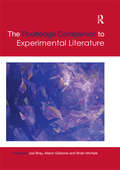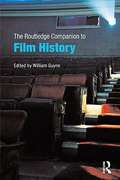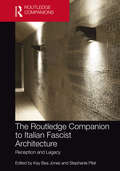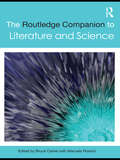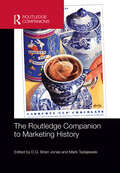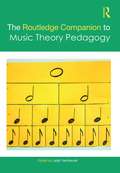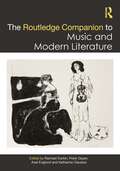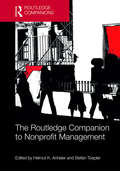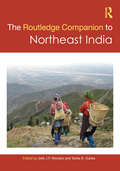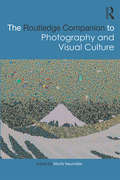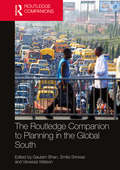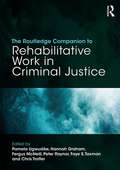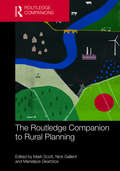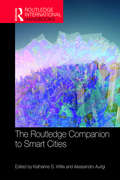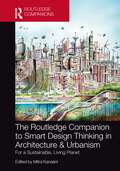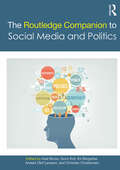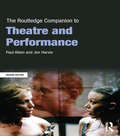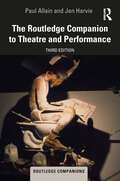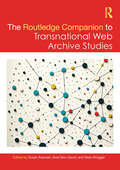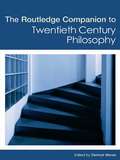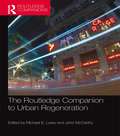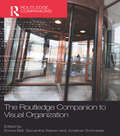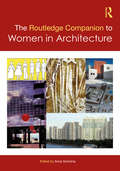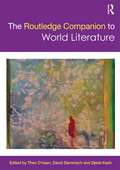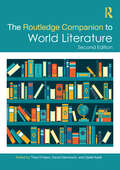- Table View
- List View
The Routledge Companion to Experimental Literature (Routledge Literature Companions)
by Alison Gibbons Joe Bray Brian McHaleWhat is experimental literature? How has experimentation affected the course of literary history, and how is it shaping literary expression today? Literary experiment has always been diverse and challenging, but never more so than in our age of digital media and social networking, when the very category of the literary is coming under intense pressure. How will literature reconfigure itself in the future? The Routledge Companion to Experimental Literature maps this expansive and multifaceted field, with essays on: the history of literary experiment from the beginning of the twentieth century to the present the impact of new media on literature, including multimodal literature, digital fiction and code poetry the development of experimental genres from graphic narratives and found poetry through to gaming and interactive fiction experimental movements from Futurism and Surrealism to Postmodernism, Avant-Pop and Flarf. Shedding new light on often critically neglected terrain, the contributors introduce this vibrant area, define its current state, and offer exciting new perspectives on its future. This volume is the ideal introduction for those approaching the study of experimental literature for the first time or looking to further their knowledge.
The Routledge Companion to Film History
by William GuynnThe Routledge Companion to Film History is an indispensible guide for anyone studying film history for the first time. Incorporating a series of 11 introductory, critical essays on key subject areas, with a dictionary of key names and terms, it serves to introduce the reader to the field of film history in a comprehensive and well-rounded manner.
The Routledge Companion to Italian Fascist Architecture: Reception and Legacy
by Kay Bea Jones Stephanie PilatToday, nearly a century after the National Fascist Party came to power in Italy, questions about the built legacy of the regime provoke polemics among architects and scholars. Mussolini’s government constructed thousands of new buildings across the Italian Peninsula and islands and in colonial territories. From hospitals, post offices and stadia to housing, summer camps, Fascist Party Headquarters, ceremonial spaces, roads, railways and bridges, the physical traces of the regime have a presence in nearly every Italian town. The Routledge Companion to Italian Fascist Architecture investigates what has become of the architectural and urban projects of Italian fascism, how sites have been transformed or adapted and what constitutes the meaning of these buildings and cities today. The essays include a rich array of new arguments by both senior and early career scholars from Italy and beyond. They examine the reception of fascist architecture through studies of destruction and adaptation, debates over reuse, artistic interventions and even routine daily practices, which may slowly alter collective understandings of such places. Paolo Portoghesi sheds light on the subject from his internal perspective, while Harald Bodenschatz situates Italy among period totalitarian authorities and their symbols across Europe. Section editors frame, synthesize and moderate essays that explore fascism’s afterlife; how the physical legacy of the regime has been altered and preserved and what it means now. This critical history of interpretations of fascist-era architecture and urban projects broadens our understanding of the relationships among politics, identity, memory and place. This companion will be of interest to students and scholars in a range of fields, including Italian history, architectural history, cultural studies, visual sociology, political science and art history.
The Routledge Companion to Literature and Science (Routledge Literature Companions)
by Bruce ClarkeWith forty-four newly commissioned articles from an international cast of leading scholars, The Routledge Companion to Literature and Science traces the network of connections among literature, science, technology, mathematics, and medicine. Divided into three main sections, this volume: links diverse literatures to scientific disciplines from Artificial Intelligence to Thermodynamics surveys current theoretical and disciplinary approaches from Animal Studies to Semiotics traces the history and culture of literature and science from Greece and Rome to Postmodernism. Ranging from classical origins and modern revolutions to current developments in cultural science studies and the posthumanities, this indispensible volume offers a comprehensive resource for undergraduates, postgraduates, and researchers. With authoritative, accessible, and succinct treatments of the sciences in their literary dimensions and cultural frameworks, here is the essential guide to this vibrant area of study.
The Routledge Companion to Marketing History (Routledge Companions in Business, Management and Accounting)
by Mark Tadajewski D.G. Brian JonesThe Routledge Companion to Marketing History is the first collection of readings that surveys the broader field of marketing history, including the key activities and practices in the marketing process. With contributors from leading international scholars working in marketing history, this companion provides nine country-specific histories of marketing practice as well as a broad analysis of the field, including: the histories of advertising, retailing, channels of distribution, product design and branding, pricing strategies, and consumption behavior. While other collections have provided an overview of the history of marketing thought, this is the first of its kind to do so from the perspective of companies, industries, and even whole economies. The Routledge Companion to Marketing History ranges across many countries and industries, engaging in substantive detail with marketing practices as they were performed in a variety of historical periods extending back to ancient times. It is not to be missed by any historian or student of business.
The Routledge Companion to Music Theory Pedagogy (Routledge Music Companions)
by Leigh VanHandelToday’s music theory instructors face a changing environment, one where the traditional lecture format is in decline. The Routledge Companion to Music Theory Pedagogy addresses this change head-on, featuring battle-tested lesson plans alongside theoretical discussions of music theory curriculum and course design. With the modern student in mind, scholars are developing creative new approaches to teaching music theory, encouraging active student participation within contemporary contexts such as flipped classrooms, music industry programs, and popular music studies. This volume takes a unique approach to provide resources for both the conceptual and pragmatic sides of music theory pedagogy. Each section includes thematic "anchor" chapters that address key issues, accompanied by short "topics" chapters offering applied examples that instructors can readily adopt in their own teaching. In eight parts, leading pedagogues from across North America explore how to most effectively teach the core elements of the music theory curriculum: Fundamentals Rhythm and Meter Core Curriculum Aural Skills Post-Tonal Theory Form Popular Music Who, What, and How We Teach A broad musical repertoire demonstrates formal principles that transcend the Western canon, catering to a diverse student body with diverse musical goals. Reflecting growing interest in the field, and with an emphasis on easy implementation, The Routledge Companion to Music Theory Pedagogy presents strategies and challenges to illustrate and inspire, in a comprehensive resource for all teachers of music theory.
The Routledge Companion to Music and Modern Literature (Routledge Music Companions)
by Rachael DurkinModern literature has always been obsessed by music. It cannot seem to think about itself without obsessing about music. And music has returned the favour. The Routledge Companion to Music and Modern Literature addresses this relationship as a significant contribution to the burgeoning field of word and music studies. The 37 chapters within consider the partnership through four lenses—the universal, opera and literature, musical and literary forms, and popular music and literature—and touch upon diverse and pertinent themes for our modern times, ranging from misogyny to queerness, racial inequality to the claimed universality of whiteness. This Companion therefore offers an essential resource for all who try to decode the musico-literary exchange.
The Routledge Companion to Nonprofit Management (Routledge Companions in Business and Management)
by Helmut K. Anheier;Stefan ToeplerOver the past three decades or so, the nonprofit, voluntary, or third sector has undergone a major transformation from a small cottage industry to a major economic force in virtually every part of the developed world as well as elsewhere around the globe. Nonprofit organizations are now major providers of public services working in close cooperation with governments at all levels and increasingly find themselves in competition with commercial firms across various social marketplaces. This transformation has come with ever-increasing demands for enhancing the organizational capacities and professionalizing the management of nonprofit institutions. The Routledge Companion to Nonprofit Management is the first internationally focused effort to capture the full breadth of current nonprofit management research and knowledge that has arisen in response to these developments. With newly commissioned contributions from an international set of scholars at the forefront of nonprofit management research, this volume provides a thorough overview of the most current management thinking in this field. It contextualizes nonprofit management globally, provides an extensive introduction to key management functions, core revenue sources and the emerging social enterprise space, and raises a number of emerging topics and issues that will shape nonprofit management in future decades. As graduate programs continue to evolve to serve the training needs in the field, The Routledge Companion to Nonprofit Management is an essential reference and resource for graduate students, researchers, and practitioners interested in a deeper understanding of the operation of the nonprofit sector.
The Routledge Companion to Northeast India
by Jelle J.P. Wouters and Tanka B. SubbaThe Routledge Companion to Northeast India is a trans-disciplinary and comprehensive compendium of a vital yet under-researched region in South Asia. It provides a unique guide to prevailing themes, theories, arguments, and history of Northeast India by discussing its life-forms – human and not – languages, landscapes, and lifeways in all its diversity and difference. The companion contains authoritative entries from leading specialists from and on the region and offers clear, concise, and illuminating explanations of key themes and ideas. A hands-on, practical, and comprehensive guide to Northeast India, this companion fills a significant gap in the literature and will be an invaluable teaching, learning, and research resource for scholars and students of Northeast India Studies, South Asian and Southeast Asian societies, culture, politics, humanities, and the social sciences in general.
The Routledge Companion to Photography and Visual Culture (Routledge Art History and Visual Studies Companions)
by Moritz NeumüllerThe Routledge Companion to Photography and Visual Culture is a seminal reference source for the ever-changing field of photography. Comprising an impressive range of essays and interviews by experts and scholars from across the globe, this book examines the medium’s history, its central issues and emerging trends, and its much-discussed future. The collected essays and interviews explore the current debates surrounding the photograph as object, art, document, propaganda, truth, selling tool, and universal language; the perception of photography archives as burdens, rather than treasures; the continual technological development reshaping the field; photography as a tool of representation and control, and more. One of the most comprehensive volumes of its kind, this companion is essential reading for photographers and historians alike.
The Routledge Companion to Planning in the Global South (Routledge International Handbooks)
by Smita Srinivas Vanessa Watson Gautam BhanThe Routledge Companion to Planning in the Global South offers an edited collection on planning in parts of the world which, more often than not, are unrecognised or unmarked in mainstream planning texts. In doing so, its intention is not to fill a ‘gap’ that leaves this ‘mainstream’ unquestioned but to re-theorise planning from a deep understanding of ‘place’ as well as a commitment to recognise the diverse modes of practice that come within it. The chapters thus take the form not of generalised, ‘universal’ analyses and prescriptions, but instead are critical and located reflections in thinking about how to plan, act and intervene in highly complex city, regional and national contexts. Chapter authors in this Companion are not all planners, or are planners of very different kinds, and this diversity ensures a rich variety of insights, primarily based on cases, to emphasise the complexity of the world in which planning is expected to happen. The book is divided into a framing Introduction followed by five sections: planning and the state; economy and economic actors; new drivers of urban change; landscapes of citizenship; and planning pedagogy. This volume will be of interest to all those wanting to explore the complexities of planning practice and the need for new theories of knowledge from which to draw insight to face the challenges of the 21st century.
The Routledge Companion to Rehabilitative Work in Criminal Justice
by Faye S. Taxman Chris Trotter Peter Raynor Pamela Ugwudike Fergus McNeill Hannah GrahamAll the world’s criminal justice systems need to undertake direct work with people who have come into their care or are under their supervision as a result of criminal offences. Typically, this is organized in penal and correctional services – in custody in prisons, or in the community, supervised by services such as probation. Bringing together international experts, this book is the go-to source for students, researchers, and practitioners in criminal justice, looking for a comprehensive and authoritative summary of available knowledge in the field. Covering a variety of contexts, settings, needs, and approaches, and drawing on theory and practice, this Companion brings together over 90 entries, offering readers concise and definitive overviews of a range of key contemporary issues on working with offenders. The book is split into thematic sections and includes coverage of: Theories and models for working with offenders Policy contexts of offender supervision and rehabilitation Direct work with offenders Control, surveillance, and practice Resettlement Application to specific groups, including female offenders, young offenders, families, and ethnic minorities Application to specific needs and contexts, such as substance misuse, mental health, violence, and risk assessment Practitioner and offender perspectives The development of an evidence base This book is an essential and flexible resource for researchers and practitioners alike and is an authoritative guide for students taking courses on working with offenders, criminal justice policy, probation, prisons, penology, and community corrections.
The Routledge Companion to Rural Planning
by Nick Gallent Mark Scott Menelaos GkartziosThe Routledge Companion to Rural Planning provides a critical account and state of the art review of rural planning in the early years of the twenty-first century. Looking across different international experiences – from Europe, North America and Australasia to the transition and emerging economies, including BRIC and former communist states – it aims to develop new conceptual propositions and theoretical insights, supported by detailed case studies and reviews of available data. The Companion gives coverage to emerging topics in the field and seeks to position rural planning in the broader context of global challenges: climate change, the loss of biodiversity, food and energy security, and low carbon futures. It also looks at old, established questions in new ways: at social and spatial justice, place shaping, economic development, and environmental and landscape management. Planning in the twenty-first century must grapple not only with the challenges presented by cities and urban concentration, but also grasp the opportunities – and understand the risks – arising from rural change and restructuring. Rural areas are diverse and dynamic. This Companion attempts to capture and analyse at least some of this diversity, fostering a dialogue on likely and possible rural futures between a global community of rural planning researchers. Primarily intended for scholars and graduate students across a range of disciplines, such as planning, rural geography, rural sociology, agricultural studies, development studies, environmental studies and countryside management, this book will prove to be an invaluable and up-to-date resource.
The Routledge Companion to Smart Cities (Routledge International Handbooks)
by Katharine S. Willis Alessandro AurigiThe Routledge Companion to Smart Cities explores the question of what it means for a city to be ‘smart’, raises some of the tensions emerging in smart city developments and considers the implications for future ways of inhabiting and understanding the urban condition. The volume draws together a critical and cross-disciplinary overview of the emerging topic of smart cities and explores it from a range of theoretical and empirical viewpoints. This timely book brings together key thinkers and projects from a wide range of fields and perspectives into one volume to provide a valuable resource that would enable the reader to take their own critical position within the topic. To situate the topic of the smart city for the reader and establish key concepts, the volume sets out the various interpretations and aspects of what constitutes and defines smart cities. It investigates and considers the range of factors that shape the characteristics of smart cities and draws together different disciplinary perspectives. The consideration of what shapes the smart city is explored through discussing three broad ‘parts’ – issues of governance, the nature of urban development and how visions are realised – and includes chapters that draw on empirical studies to frame the discussion with an understanding not just of the nature of the smart city but also how it is studied, understood and reflected upon. The Companion will appeal to academics and advanced undergraduates and postgraduates from across many disciplines including Urban Studies, Geography, Urban Planning, Sociology and Architecture, by providing state of the art reviews of key themes by leading scholars in the field, arranged under clearly themed sections.
The Routledge Companion to Smart Design Thinking in Architecture & Urbanism for a Sustainable, Living Planet
by Mitra KanaaniThis comprehensive companion surveys intelligent design thinking in architecture and urbanism, investigates multiple facets of "smart" approaches to design thinking that augment the potentials of user experiences as well as his/her physical and mental interactions with the built environment.Split into six paradigms, this volume looks at the theoretical and historical background of smart design, smart design methodologies and typologies, smart materials, smart design for extreme weather and climatic regions, as well as climate change issues and side effects, smart mobility, and the role of digital technologies and simulations in architectural and urban design. Often at odds with each other, this volume places emphasis on smart design for various typologies and user groups, emphasizing on advancements in form-making and implementation of technology for healthy and sustainable living environments.Written by emerging and established architects, planners, designers, scientists, and engineers from around the globe, this will be an essential reference volume for architecture and urban design students and scholars as well as those in related fields interested in the implications, various facets and futures of smart design.
The Routledge Companion to Social Media and Politics (Routledge Media and Cultural Studies Companions)
by Axel Bruns, Gunn Enli, Eli Skogerbø, Anders Olof Larsson and Christian ChristensenSocial media are now widely used for political protests, campaigns, and communication in developed and developing nations, but available research has not yet paid sufficient attention to experiences beyond the US and UK. This collection tackles this imbalance head-on, compiling cutting-edge research across six continents to provide a comprehensive, global, up-to-date review of recent political uses of social media. Drawing together empirical analyses of the use of social media by political movements and in national and regional elections and referenda, The Routledge Companion to Social Media and Politics presents studies ranging from Anonymous and the Arab Spring to the Greek Aganaktismenoi, and from South Korean presidential elections to the Scottish independence referendum. The book is framed by a selection of keystone theoretical contributions, evaluating and updating existing frameworks for the social media age.
The Routledge Companion to Theatre and Performance (Routledge Companions)
by Paul Allain Jen HarvieWhat is theatre? What is performance? What connects them and how are they different? What events, people, practices and ideas have shaped theatre and performance in the twentieth and twenty-first century? The Routledge Companion to Theatre and Performance offers some answers to these big questions. It provides an analytical, informative and engaging introduction to important people, companies, events, concepts and practices that have defined the complementary fields of theatre and performance studies. This fully updated second edition contains three easy to use alphabetized sections including over 120 revised entries on topics and people ranging from performance artist Ron Athey, to directors Vsevold Meyerhold and Robert Wilson, megamusicals , postdramatic theatre and documentation. Each entry includes crucial historical and contextual information, extensive cross-referencing, detailed analysis and an annotated bibliography. The Routledge Companion to Theatre and Performance is a perfect reference guide for the keen student.
The Routledge Companion to Theatre and Performance (Routledge Companions)
by Paul Allain Jen HarvieWhat is theatre? What is performance? What connects them and how are they different? How have they been shaped by events, people, companies, practices and ideas in the twentieth and twenty-first centuries? And where are they heading next? The Routledge Companion to Theatre and Performance offers some answers to these big questions. This third edition has been updated to now include over 160 entries, with all entries brought up to date and new topics added, including Caryl Churchill, Black Lives Matter and Hamilton, among others.This book provides an accessible, informative and engaging introduction to important people and companies, events, concepts and practices that have defined the complementary fields of theatre and performance studies. Three easy-to-use alphabetized sections include entries on topics and people ranging from performance artists Marina Abramović and Pope.L to directors Vsevolod Meyerhold and Robert Wilson, the haka, Taking the Knee and disability, theatre and performance. Each entry includes important historical and contextual information, extensive cross-referencing, detailed analysis and an annotated bibliography.The Routledge Companion to Theatre and Performance is a perfect reference guide for the keen student and the passionate theatre-goer alike.
The Routledge Companion to Transnational Web Archive Studies (Routledge Companions to the Digital Humanities)
by Susan Aasman Niels Brügger Anat Ben-DavidThe Routledge Companion to Transnational Web Archive Studies explores the untapped potential of web archives for researching transnational digital history and communication. It covers cross- border, cross- collection, and cross- institutional examination of web archives on a global scale.This comprehensive collaborative work, emerging from the WARCnet research network, presents an exploration of the ways web archive research can transcend technological and legal challenges to allow for new comparative, transnational studies of the web’s pasts, and of global events. By combining interdisciplinary work and fostering collaboration between web archivists and researchers, the book provides readers with cutting- edge approaches to analyzing digital cultural heritage across countries. The book contains concrete examples on how to research national web domains through a transnational perspective; provides case studies with grounded explorations of the COVID- 19 crisis as a distinctly transnational event captured by web archives; offers methodological considerations while unpacking techniques and skill sets for conducting transnational web archive research; and critically engages the politics and power dynamics inherent to web archives as institutionalised collections.The Routledge Companion to Transnational Web Archive Studies is an essential read for graduate students and scholars from internet and media studies, cultural studies, history, and digital humanities. It will also appeal to web archiving practitioners, including librarians, web curators, and IT developers.
The Routledge Companion to Twentieth Century Philosophy (Routledge Philosophy Companions)
by Dermot MoranThe twentieth century was one of the most significant and exciting periods ever witnessed in philosophy, characterized by intellectual change and development on a massive scale. The Routledge Companion to Twentieth Century Philosophy is an outstanding authoritative survey and assessment of the century as a whole. Featuring twenty-two chapters written by leading international scholars, this collection is divided into five clear parts and presents a comprehensive picture of the period for the first time: major themes and movements logic, language, knowledge and metaphysics philosophy of mind, psychology and science phenomenology, hermeneutics, existentialism, and critical theory politics, ethics, aesthetics. Featuring annotated further reading and a comprehensive glossary, The Routledge Companion to Twentieth Century Philosophy is indispensable for anyone interested in philosophy over the last one hundred years, suitable for both expert and novice alike.
The Routledge Companion to Urban Regeneration
by John McCarthy Michael E. LearyIn the past decade, urban regeneration policy makers and practitioners have faced a number of difficult challenges, such as sustainability, budgetary constraints, demands for community involvement and rapid urbanization in the Global South. Urban regeneration remains a high profile and important field of government-led intervention, and policy and practice continue to adapt to the fresh challenges and opportunities of the 21st century, as well as confronting long standing intractable urban problems and dilemmas. This Companion provides cutting edge critical review and synthesis of recent conceptual, policy and practical developments within the field. With contributions from 70 international experts within the field, it explores the meaning of ‘urban regeneration’ in differing national contexts, asking questions and providing informed discussion and analyses to illuminate how an apparently disparate field of research, policy and practice can be rendered coherent, drawing out common themes and significant differences. The Companion is divided into six sections, exploring: globalization and neo-liberal perspectives on urban regeneration; emerging reconceptualizations of regeneration; public infrastructure and public space; housing and cosmopolitan communities; community centred regeneration; and culture-led regeneration. The concluding chapter considers the future of urban regeneration and proposes a nine-point research agenda. This Companion assembles a diversity of approaches and insights in one comprehensive volume to provide a state of the art review of the field. It is a valuable resource for both advanced undergraduate and postgraduate students in Urban Planning, Built Environment, Urban Studies and Urban Regeneration, as well as academics, practitioners and politicians.
The Routledge Companion to Visual Organization (Routledge Companions in Business, Management and Accounting)
by Emma Bell Jonathan Schroeder Samantha WarrenThe visual constitutes an increasingly significant element of contemporary organization, as post-industrial societies move towards economies founded on creative and knowledge-intensive industries. The visual has thereby entered into almost every aspect of corporate strategy, operations, and communication; reconfiguring basic notions of management practice and introducing new challenges in the study of organizations. This volume provides a comprehensive insight into the ways in which organizations and their members visualize their identities and practices and how they are viewed by those who are external to organizations, including researchers. With contributions from leading academics across the world, The Routledge Companion to Visual Organization is a valuable reference source for students and academics interested in disciplines such as film studies, entrepreneurship, marketing, sociology and most importantly, organizational behaviour.
The Routledge Companion to Women in Architecture
by Anna SokolinaThe Routledge Companion to Women in Architecture illuminates the names of pioneering women who over time continue to foster, shape, and build cultural, spiritual, and physical environments in diverse regions around the globe. It uncovers the remarkable evolution of women’s leadership, professional perspectives, craftsmanship, and scholarship in architecture from the preindustrial age to the present.The book is organized chronologically in five parts, outlining the stages of women’s expanding engagement, leadership, and contributions to architecture through the centuries. It contains twenty-nine chapters written by thirty-three recognized scholars committed to probing broader topographies across time and place and presenting portraits of practicing architects, leaders, teachers, writers, critics, and other kinds of professionals in the built environment. The intertwined research sets out debates, questions, and projects around women in architecture, stimulates broader studies and discussions in emerging areas, and becomes a catalyst for academic programs and future publications on the subject.The novelty of this volume is in presenting not only a collection of case studies but in broadening the discipline by advancing an incisive overview of the topic as a whole. It is an invaluable resource for architectural historians, academics, students, and professionals.
The Routledge Companion to World Literature (Routledge Literature Companions)
by David Damrosch Djelal Kadir Theo D’haenIn the age of globalization, the category of "World Literature" is increasingly important to academic teaching and research. The Routledge Companion to World Literature offers a comprehensive pathway into this burgeoning and popular field. Separated into four key sections, the volume covers: the history of World Literature through significant writers and theorists from Goethe to Said, Casanova and Moretti the disciplinary relationship of World Literature to areas such as philology, translation, globalization and diaspora studies theoretical issues in World Literature including gender, politics and ethics a global perspective on the politics of World Literature. The forty-eight outstanding contributors to this companion offer an ideal introduction to those approaching the field for the first time, or looking to further their knowledge of this extensive field.
The Routledge Companion to World Literature (Routledge Literature Companions)
by David Damrosch Djelal Kadir Theo D’haenThis fully updated new edition of The Routledge Companion to World Literature contains ten brand new chapters on topics such as premodern world literature, migration studies, world history, artificial intelligence, global Englishes, remediation, crime fiction, Lusophone literature, Middle Eastern literature, and oceanic studies. Separated into four key sections, the volume covers: • the history of world literature through significant writers and theorists from Goethe to Said, Casanova and Moretti; • the disciplinary relationship of world literature to areas such as philology, translation, globalization, and diaspora studies; • theoretical issues in world literature, including gender, politics, and ethics; and • a global perspective on the politics of world literature. Comprehensive yet accessible, this book is ideal as an introduction to world literature or for those looking to extend their knowledge of this essential field.
